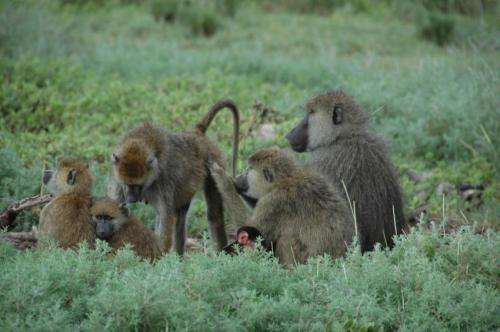Supportive moms and sisters boost female baboon's rank

A study of dominance in female baboons suggests that the route to a higher rank is to maintain close ties with mom, and to have lots of supportive sisters.
A female baboon's social status is dictated not by size or strength, but by the rank of her mother -– the higher the mother is ranked, the higher-ranked her daughter will be. For this reason, dominance rank in female baboons is thought to be determined at birth. Females born to high-ranking mothers are guaranteed a good spot in the pecking order, whereas females born to low-ranking mothers are usually stuck with their lot.
"Daughters of high-ranking females generally mature more quickly, produce more offspring, and have better access to food and mates. It's like being born with a silver spoon in your mouth," said Duke University biology professor Susan Alberts.
But her group's study in the August 2014 issue of Animal Behaviour suggests there may be more social mobility in baboon society than previously thought.
Alberts and graduate student Amanda Lea of Duke and colleagues studied data from a population of wild yellow baboons that has been under close observation since 1971 near Mount Kilimanjaro in Kenya.
The researchers determined dominance rank for the animals by analyzing pairwise interaction data collected for nine social groups over 33 years (from 1977 to 2010), and noting how the animals behaved. Females who are higher on the social ladder harass those lower in the ranks as a reminder of their right to first dibs on food or favored resting spots. A high-ranking female may assert her dominance by baring her teeth, lunging or slapping the ground, while a subordinate cowers, grimaces in fear, averts her gaze or slinks away.
By comparing each female's rank at sexual maturity—measured as the age at her first period—with her position when she first became a mother, the researchers were able to track social mobility across early adulthood.
Nearly 25 percent of females either climbed up or slipped down the baboon social ladder, rising higher or lower than expected by the time they became mothers.
Downwardly mobile females had mothers who spent less time with them while they were growing up—either because mothers and daughters were separated during a splitting of the group or because the mothers died before their daughters reached adulthood. Such was the case with a young female named Abby, whose mother died when she was two and who never managed to achieve her expected rank.
It's no surprise that having mom around is a good thing. Mothers intervene on behalf of their daughters in 'playground spats' over food or mates, and thus help ensure their daughters' place in the pecking order, Alberts said.
But having the support of sisters proved to be a big help, too. The researchers found that females with more sisters were more likely to reach the rank transmitted from their mother.
Sisters give each other a boost by ganging up on unrelated rivals. But sisterly love has its limits: Older sisters help their younger sisters out when it comes to rising above females from other families, but when it comes to rising in rank within the family, older sisters aren't much help. The researchers found that the more sisters a young female had, the less likely those sisters were to cede their own position to the younger sister.
Fathers and brothers had surprisingly little influence on the social status of their female kin, possibly because they tend to mate with multiple female partners, making their allegiances murkier than they are for females.
"One of his daughters may be fighting with another daughter from another mom, for example, or with another female that he wants to mate with," Alberts explained, so he can't or won't intercede.
The study is part of a larger field of research on the benefits for our animal cousins of maintaining strong social ties with relatives.
More information: Animal Behaviour DOI: 10.1016/j.anbehav.2014.05.019
Journal information: Animal Behaviour
Provided by Duke University




















